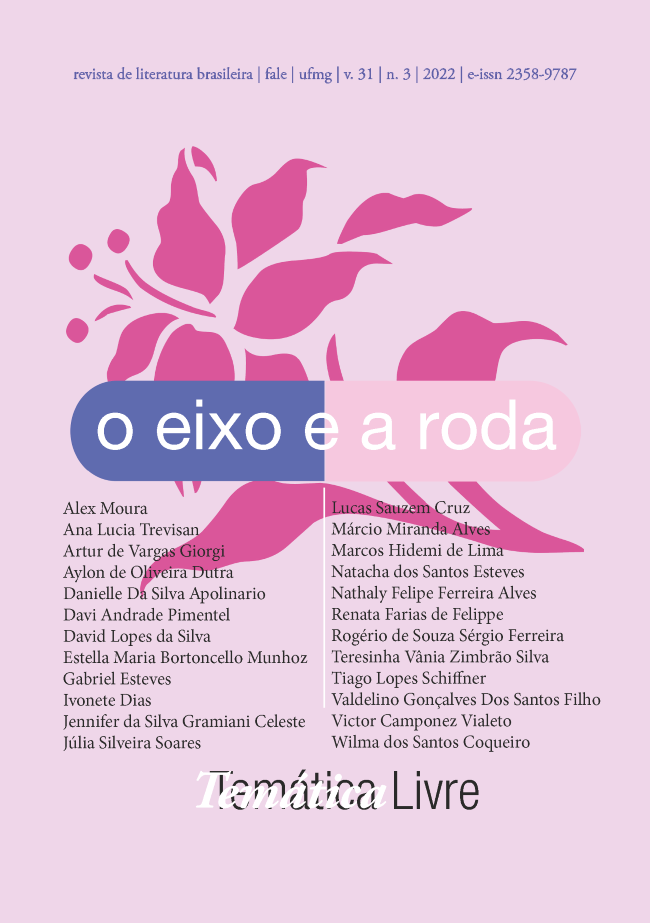Silêncios que ecoam
a dominação masculina no romance A ponta do silêncio (2016), de Valesca de Assis
DOI:
https://doi.org/10.17851/2358-9787.31.3.64-81Parole chiave:
Valesca de Assis, a ponta do silêncio, dominação masculina, violência domésticaAbstract
Ambientado na pacata cidade de Cruzeiro, o romance A ponta do silêncio (2016), da escritora gaúcha Valesca de Assis, traz como trama o assassinato de Rudy Treibel, um sujeito pertencente à nata da sociedade cruzeirense e conhecido por todos. A única suspeita do crime é sua esposa, a professora Marga Treibel, que, para se defender, só pode utilizar a escrita, visto que perdeu a voz após o acontecido. Dessa forma, Marga passa a escrever cartas e, por meio delas, mostra detalhes de seu casamento abusivo e do comportamento violento do marido. Com base nisso, o presente estudo se ocupa de escrutinar a dominação masculina perpetrada na vida de Marga, mostrando como isso impactou diretamente no desfecho da obra. Além disso, tendo em vista que se trata de uma personagem escritora, que se expressa pela escrita, o foco analítico deste ensaio também recai sobre o processo de subjetivação que Marga encontra ao escrever, tendo como embasamento estudos oriundos da crítica feminista contemporânea. Ademais, visando à defesa de Marga, estudos sobre a dominação masculina também serão utilizados para ratificar os argumentos da personagem. Palavras-chave: Valesca de Assis; a ponta do silêncio; dominação masculina; violência doméstica.
Riferimenti bibliografici
ASSIS, Valesca de. A ponta do silêncio. Porto Alegre: BesouroBox, 2016.
BONNICI, Thomas. O cânone literário e a crítica literária: o debate entre a exclusão e a inclusão. In: BONNICI, Thomas; FLORY, Alexandre Villibor; PRADO, Márcio Roberto do. (org.). Margens instáveis: tensões entre teoria, crítica e história da literatura. Maringá: Eduem, 2011. p. 101-128.
BOURDIEU, Pierre. A dominação masculina. Tradução de Maria Helena Kühner. 13. ed. Rio de Janeiro: Bertrand Brasil, 2015.
BRANDÃO, Ruth Silviano. A vida escrita. Rio de Janeiro: 7 Letras, 2006.
DUARTE, Constância Lima. Literatura feminina e crítica literária. In: ALMEIDA, Ana Lúcia (org). A mulher na literatura. II Encontro Nacional do ANPOLL. Belo Horizonte: Imprensa da Universidade Federal de Minas Gerais, 1990. p. 13 - 17.
GIANNETTI, Eduardo. O livro das citações. Editora Companhia das Letras, 2008. Não paginado.
KOHLRAUSCH, Regina. A ponta do silêncio. Patrimônio e Memória, São Paulo, v. 13, n. 1, p. 290-292, 2017.
MUZART, L. A questão do cânone. Anuário de Literatura, [s. l.], v. 3, n. 3, p. 85–93, 1995. DOI: 10.5007/%x. Disponível em: https://periodicos.ufsc.br/index.php/literatura/article/view/5277. Acesso em: 20 out. 2022.
PEREIRA, Maria do Rosário A. Que corpo é esse na literatura contemporânea escrita por mulheres? Revista Fórum Identidades, Sergipe, v. 33, n. 1, p. 87-100, jan.-jun. 2021.
REIS, Roberto. “Cânon” In: JOBIM, José Luís (org.). Palavras da crítica. Rio de Janeiro: Imago, 1992. p. 65 - 92.
SOLNIT, Rebecca. Os homens explicam tudo para mim. Tradução de Isa Mara Lando. São Paulo: Cultrix, 2017.
STEFFEN, Ana Cristina. O feminino silenciado e o feminino por escrito em A ponta do silêncio, de Valesca de Assis. Scripta Uniandrade, Curitiba, v. 18, n. 3, 2020, p. 303-317.
TOURAINE, Alain. O mundo das mulheres. Tradução de Francisco Morás. 3. ed. Petrópolis: Vozes, 2011.
TORRES, Beatriz Flores. As vozes em meio ao silêncio: uma análise da obra A ponta do silêncio. 2020. 40 p. Trabalho de Conclusão de Curso (Licenciatura em Língua Portuguesa) – Escola de Humanidades, Pontifícia Universidade Católica do Rio Grande do Sul, Porto Alegre, 2020.
WOOLF, Virginia. Um teto todo seu. Tradução de Bia Nunes de Sousa, Glauco Mattoso. São Paulo: Tordesilhas, 2014.
ZOLIN, Lúcia Osana. Crítica Feminista. In: BONNICI, Thomas; ZOLIN, Lúcia Osana (orgs.). Teoria Literária: Abordagens históricas e tendências contemporâneas. 4. ed. Maringá: Eduem, 2019a. p. 211-237.
ZOLIN, Lúcia Osana. Literatura de Autoria Feminina. In: BONNICI, Thomas; ZOLIN, Lúcia Osana (org.). Teoria Literária: abordagens históricas e tendências contemporâneas. 4. ed. Maringá: Eduem, 2019b, p. 319-330.










